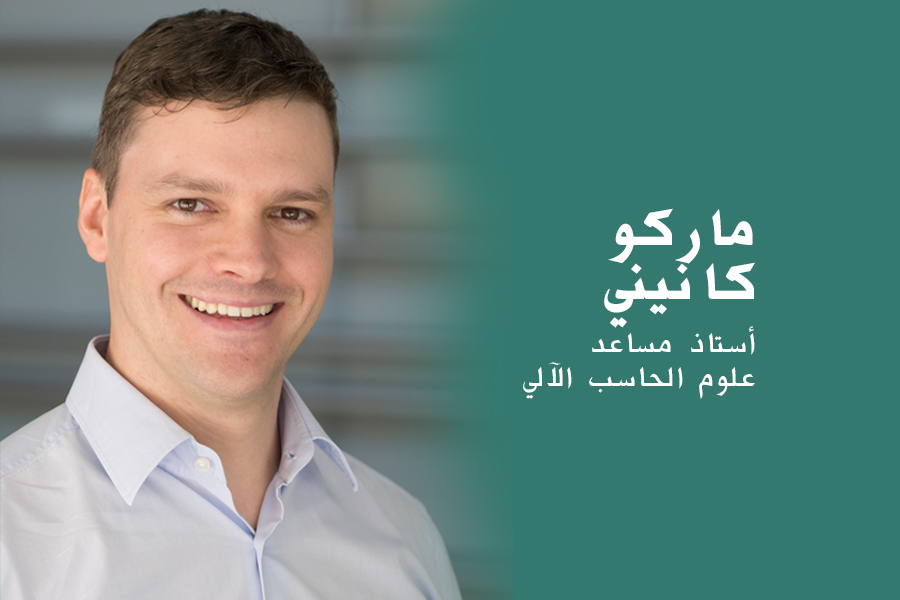Faculty Focus: Marco Canini

Marco Canini, assistant professor of computer science in the University's Computer, Electrical and Mathematical Science and Engineering Division.
Marco Canini is an assistant professor in the Computer, Electrical and Mathematical Science and Engineering (CEMSE) Division. His research interests are in the principled construction and operation of large-scale networked computer systems, and specifically in distributed systems, large-scale computing and computer networking with an emphasis on cloud computing and programmable networks. His current work focuses on improving networked systems design, implementation and operation along several vital properties such as reliability, performance, security and energy efficiency. A particular thrust of his research centers around the development of Software-Defined Advanced Networked and Distributed Systems (SANDS).
Canini noted, “I design, build, measure and analyze large-scale networked systems that span multiple autonomous and potentially untrusted entities. I am excited for the ultimate goal of my work, which is to distill fundamental principles towards enriching our knowledge on how to build scalable, dependable and future-proof systems worthy of society's trust.”
“Despite five decades of systems research, we are still far from mastering a science for building systems,” he continued. “Moreover, today we are experiencing radical technological trends and paradigm shifts that require us to revisit many of the decisions and designs laid out before. There are ever-growing volumes of data that need to be analyzed and new services that connect ever more people and devices. At the same time, Moore's law, which has sustained decades of scaling, is coming to a halt, and we do not have a good solution to scaling beyond it without practical limit. This context makes for very exciting times.”
Canini came to KAUST in July of 2016 and completed his bachelor’s, master’s and Ph.D. degrees at the University of Genoa, Italy, after spending the last year of his Ph.D. as a visiting student at the University of Cambridge. He has worked as a postdoctoral researcher at École Polytechnique Fédérale de Lausanne (EPFL) in Switzerland; a senior research scientist at TU Berlin; and an assistant professor at Université catholique de Louvain in Belgium. Canini has also worked in the technology industry for Google, Intel and Deutsche Telekom.
“I believe KAUST will have a longstanding impact on society through scientific and technological breakthroughs and through education of the bright minds of the future, producing critical thinkers and leaders in science and technology,” he said. “For me, it is wonderful to be part of a diverse and international community that is passionate about advancing science and technology to solve fundamental societal challenges.”
-By David Murphy, KAUST News.
Marco Canini is an assistant professor in the Computer, Electrical and Mathematical Science and Engineering (CEMSE) Division. His research interests are in the principled construction and operation of large-scale networked computer systems, and specifically in distributed systems, large-scale computing and computer networking with an emphasis on cloud computing and programmable networks. His current work focuses on improving networked systems design, implementation and operation along several vital properties such as reliability, performance, security and energy efficiency. A particular thrust of his research centers around the development of Software-Defined Advanced Networked and Distributed Systems (SANDS).
Canini noted, “I design, build, measure and analyze large-scale networked systems that span multiple autonomous and potentially untrusted entities. I am excited for the ultimate goal of my work, which is to distill fundamental principles towards enriching our knowledge on how to build scalable, dependable and future-proof systems worthy of society's trust.”
“Despite five decades of systems research, we are still far from mastering a science for building systems,” he continued. “Moreover, today we are experiencing radical technological trends and paradigm shifts that require us to revisit many of the decisions and designs laid out before. There are ever-growing volumes of data that need to be analyzed and new services that connect ever more people and devices. At the same time, Moore's law, which has sustained decades of scaling, is coming to a halt, and we do not have a good solution to scaling beyond it without practical limit. This context makes for very exciting times.”
Canini came to KAUST in July of 2016 and completed his bachelor’s, master’s and Ph.D. degrees at the University of Genoa, Italy, after spending the last year of his Ph.D. as a visiting student at the University of Cambridge. He has worked as a postdoctoral researcher at École Polytechnique Fédérale de Lausanne (EPFL) in Switzerland; a senior research scientist at TU Berlin; and an assistant professor at Université catholique de Louvain in Belgium. Canini has also worked in the technology industry for Google, Intel and Deutsche Telekom.
“I believe KAUST will have a longstanding impact on society through scientific and technological breakthroughs and through education of the bright minds of the future, producing critical thinkers and leaders in science and technology,” he said. “For me, it is wonderful to be part of a diverse and international community that is passionate about advancing science and technology to solve fundamental societal challenges.”
-By David Murphy, KAUST News.

